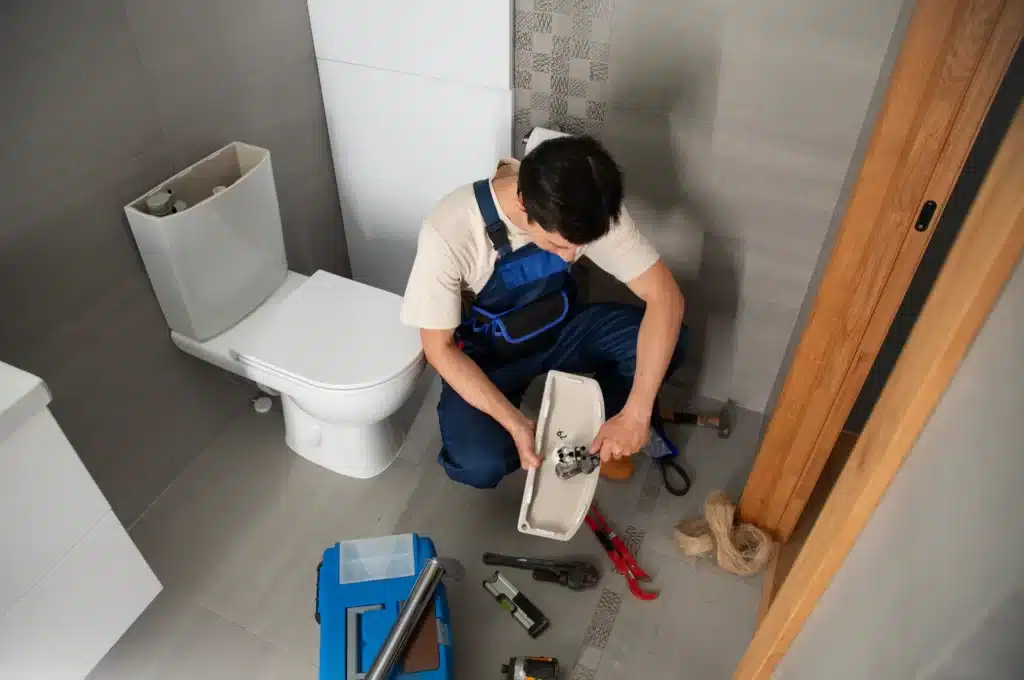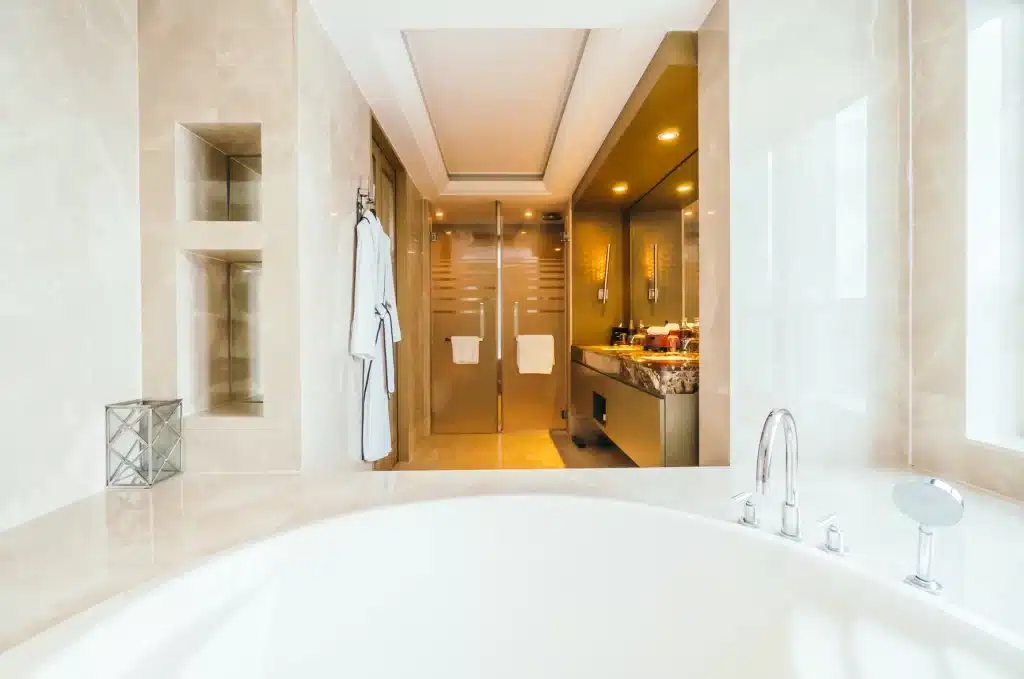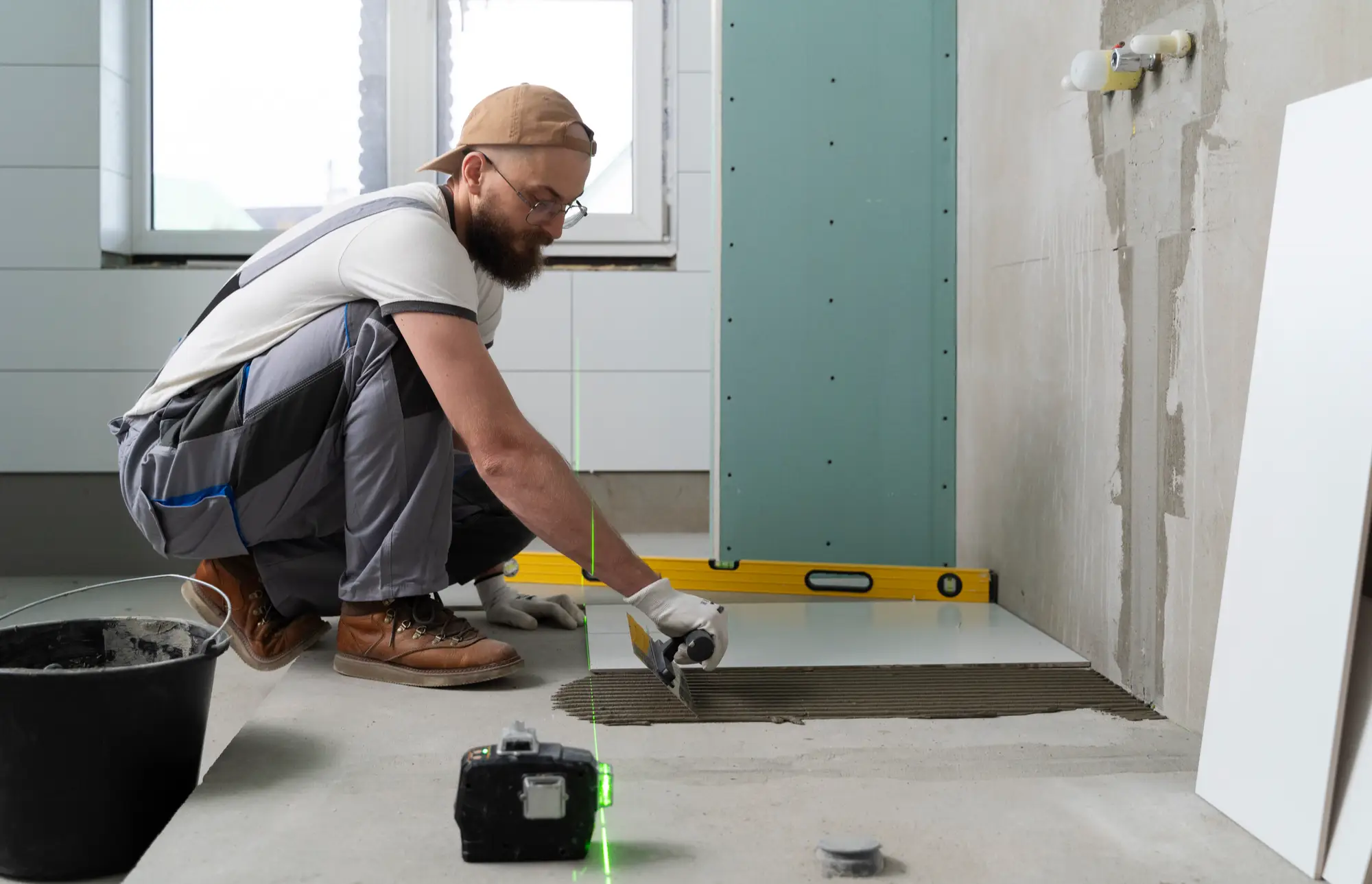Adding a new bathroom to your home is a great way to increase its functionality, comfort, and overall value. Whether you’re dreaming of a sleek, modern ensuite or just want to refresh your existing space, one of the first questions on your mind is probably, “How much does a new bathroom cost?”
Well, you’re in the right place! In this guide, we’ll break down:
✔ How much it costs to install a brand-new bathroom from scratch.
✔ The cost of a bathroom refit in the UK.
✔ Removal costs for an old bathroom.
✔ Average price of a full bathroom renovation.
✔ Feature-by-feature new bathroom cost breakdown.
✔ Tips to keep costs under control.
Let’s get started:
How much does a new bathroom cost in the UK?
If you’re starting from scratch—say, converting a spare room or adding a bathroom where there wasn’t one before—the cost can vary a lot. Why? Because it depends on factors like the size of your bathroom, the materials you choose, and whether you need major plumbing or electrical work.
For a new small bathroom (around 3-4 square metres), you’re looking at an average cost of £3,000 to £6,000 for a basic setup. This includes essentials like a toilet, sink, shower enclosure, and basic tiling.
But if you’re after something more luxurious—think underfloor heating, a freestanding bathtub, or high-end fixtures—your new bathroom cost can easily climb to £10,000 or more.
Location matters, too. In Bolton, labour costs for a bathroom fitter are around £300 per day, depending on their experience. And don’t forget about the extras: heated towel rails, extractor fans, and vanity units can all add to the overall cost.
Cost of a bathroom refit in the UK
If you’re thinking about upgrading your bathroom rather than building one from scratch, a refit is a more budget-friendly option. The new bathroom cost will always be lower when you’re simply updating existing fixtures instead of installing an entirely new setup.
A bathroom refit typically involves replacing worn-out fixtures, refreshing the tiles, and possibly installing a new shower enclosure or vanity unit—all without making significant structural changes.
On average, a bathroom refitting cost in the UK is between £2,000 and £4,000. Here’s a quick breakdown:
- New Toilet Installation – £150 – £600
- Sink & Vanity Unit – £200 – £1,500
- Shower Installation – £500 – £3,500
- Bathtub Replacement – £400 – £2,500
- New Tiling – £500 – £3,000
- Flooring Upgrade – £300 – £2,000
When to choose a bathroom refit?
✔ Your existing bathroom layout works fine.
✔ Your plumbing is in good condition.
✔ You just want a modern update without major construction.
If your bathroom feels outdated, cramped, or poorly laid out, a full renovation or new bathroom installation might be worth considering instead. Contact us today for any bathroom refitting needs in Bolton.
How much does old bathroom removal cost in the UK?
Before you can enjoy your fresh, stylish bathroom, you’ve got to deal with the old one (unless you’re starting from scratch). The cost of a new bathroom isn’t just about the installation—it starts with removing what’s already there.
If you’re stripping out everything—tiles, bath, toilet, flooring, even pipework—the bathroom installation cost will be higher than a simple removal job.
Here’s a rough breakdown of what you might pay to remove an old bathroom:
- Bathtub removal : £100 – £200
- Toilet removal: £50 – £100
- Sink or vanity unit removal: £50 – £150
- Shower enclosure removal: £70 – £150
- Tile removal: £200 – £400 (depending on the size of your bathroom)
What affects bathroom removal costs?
- Size of the bathroom – Larger spaces take longer to strip out.
- Type of materials – Heavy tiles, stone, or thick flooring are harder to remove.
- Disposal fees – Skip hire or waste removal adds to the cost (£100 – £300).
- Plumbing & electrical disconnections – Removing a shower or bath often requires professional help.
If you’re removing everything, the total cost for old bathroom removal typically ranges from £300 to £800. However, if your project involves more complex tasks—like rerouting pipes or dealing with asbestos tiles—the price could go up.
Pro tip: Always hire a professional plumber in Bolton for bathroom removal. A botched DIY job could end up costing you more in the long run!
How much does a full bathroom renovation cost?
A bathroom renovation is not as simple as swapping a few fixtures. A bathroom renovation typically includes new plumbing, tiling, flooring, electrics, and decorating—essentially transforming your bathroom into a fresh, modern space.
So how much does it cost for a full bathroom renovation? Here is the answer:
✔ New Bathroom Suite (Toilet, Sink, Bath/Shower): £1,000 – £3,500
✔ Plumbing Work (New Pipes, Drainage, Fixes): £1,500 – £4,000
✔ Shower or Bathtub Installation: £500 – £3,500
✔ Flooring & Tiling: £1,000 – £4,000
✔ Lighting & Electrical Work: £500 – £2,500
✔ Extractor Fan Installation: £150 – £500
✔ Painting & Decorating: £300 – £1,500
✔ Labour Costs (Plumbers, Electricians, Tilers, Fitters): £2,000 – £5,000
✔ Heated towel rail: £100 – £300
✔ Underfloor heating: £500 – £1,000
Don’t forget the extras! Small details like new taps, mirrors, and regrouting can increase your bathroom installation or renovation cost—so factor these into your budget.
Pro Tip: Want a Budget-Friendly Remodel by Bolton Heating and Plumbing Ltd in the UK? Stick to the existing layout, choose mid-range fixtures, and avoid unnecessary structural work. Contact Bolton Plumbing & Heating Ltd today at 01204 830 042 for a free quote.
Factors that influence new bathroom installation cost

Are you wondering which factors may influence how much a new bathroom costs? Consider the following aspects:
1. Conversion vs. new construction
One of the first factors to consider is whether you’re renovating an existing space or creating an entirely new one.
- Conversion Costs: Transforming a space like a closet, basement, or attic into a bathroom can cost between £7,000 and £40,000. This option is typically more cost-effective because you’re working within the home’s existing structure and plumbing system.
- New Construction Costs: Building a bathroom as an addition to your home involves more complex structural work, such as extending foundations, walls, and plumbing. Costs for new construction typically range from £30,000 to £60,000, depending on size and materials.
2. Location of the bathroom
The overall cost of installing a new bathroom can be significantly affected by where you want it in your home. Rooms with easier access to existing plumbing and wiring will generally cost less to convert into bathrooms.
| Location | Cost Range (£) |
| Laundry Room | 5,000–11,000 |
| Garage | 6,500–20,000 |
| Basement | 7,000–13,000 |
| Attic | 8,000–30,000 |
| Bedroom | 12,000–40,000 |
| New Construction | 30,000–60,000 |
For example, converting a laundry room or basement is less expensive because these spaces are closer to existing plumbing systems. Meanwhile, adding a bathroom to an attic or building out from the house requires more complex and costly work.
3. Size and features of the bathroom
A small bathroom (2m x 2m) is far cheaper to renovate than a large master ensuite with double sinks, a separate shower, and a freestanding bath. The bathroom’s size and the features you choose will heavily influence new bathroom installation costs.
- Half Bathroom: Includes just a toilet and sink, costing less because it requires fewer fixtures and materials.
- Three-Quarter Bathroom: Adding a shower to the setup increases the cost due to additional plumbing and waterproofing.
- Full Bathroom: Includes a bathtub and/or shower, vanity, and other features. Costs are higher because they require more space and fixtures.
4. Plumbing work needed
If your home has outdated plumbing, you might need to replace pipes, which can add £1,500 – £4,000. Moving water supply lines to a new layout is expensive. Keeping the existing setup saves money.
5. Type & quality of fixtures
A basic toilet costs £100, but a designer smart toilet can set you back £1,500+.
Standard acrylic bathtubs are £150 – £500, while freestanding stone baths start at £2,000+.
6. Flooring & tiling choices
Your choice of flooring and tiling can significantly influence the overall cost of your new bathroom. For example, ceramic tiles are a budget-friendly option, ranging from £20 to £50 per square metre (m²).
In contrast, natural stone tiles offer a luxurious aesthetic but come at a higher price, typically between £80 and £150 per m². Keep in mind that more tiling will also increase labour costs, which can range from £30 to £50 per m² for installation.
7. Electrical work required
If you need new lighting, extractor fans, underfloor heating, or shaver sockets, expect to pay £500 – £2,500. Rewiring adds another £500 – £1,500, depending on the complexity.
8. Accessibility & waste disposal
Difficult-to-access properties (e.g., apartments with no lift) might require extra labour. Skip hire for waste disposal costs £150 – £300, depending on the amount of old materials.
9. Unexpected issues
Found mould, leaks, or outdated wiring during the renovation? These surprises can increase your expenses.
10. Time of year
Believe it or not, the time of year can affect costs. Summer is the peak renovation season, so prices for materials and labour might be higher.
In general, more tiles, more flooring, more fixtures, more plumbing work = higher cost.
Breakdown of new bathroom feature installation costs
Now, let’s look at the average cost of installing individual bathroom features so you can plan your budget properly.
| Feature | Average Cost (£) |
| Bathroom Shower Installation | £1,500 – £3,000 |
| Flooring Installation | £5 – £15 per sq. ft. |
| New Shower | £300 – £700 |
| New Bathtub | £1,000 – £2,500 |
| Bathroom Sink Installation | £200 – £700 |
| New Toilet | £300 – £1,000 |
| New Radiator | £200 – £800 |
| Underfloor Heating | £1,000 – £2,500 |
| Extractor Fan | £150 – £350 |
| Bath Fitting (Labour) | £300 |
| Basin Installation | £200 |
| Bathroom Plastering | £700 |
| Bathtub Replacement | £600 |
| Decoration | £900 |
| Electrical Work | £500 – £1,000 |
| Additional Renovation | £1,000 – £3,000 |
Bathroom Shower Installation Cost
- Basic shower enclosure: £300 – £800
- Walk-in shower: £1,500 – £3,500
- Luxury rainfall shower with digital controls: £2,000 – £5,000
Bathroom Flooring Installation Cost
- Vinyl or Laminate: £1.50–£4 per square foot.
- Ceramic or Porcelain Tile: £4–£10 per square foot.
- Natural Stone or Hardwood: £10–£20 per square foot.
New Shower Cost
- Electric shower: £150 – £500
- Mixer shower: £200 – £700
- Power shower: £300 – £1,000
New Bathtub Cost
- Standard acrylic bathtub: £150 – £500
- Freestanding bath: £800 – £3,000
- Jacuzzi or spa bath: £2,500 – £5,000+
Bathroom Sink Installation Cost
- Basic pedestal basin: £100 – £300
- Wall-mounted basin: £200 – £500
- Vanity unit with storage: £300 – £1,500
New Toilet Cost
- Basic close-coupled toilet: £100 – £300
- Wall-hung toilet: £250 – £600
- Smart toilet (bidet function, heated seat, etc.): £800 – £2,500
New Radiator Cost
- Standard heated towel rail: £100 – £400
- Designer radiator: £300 – £1,200
Bathroom Underfloor Heating Cost
- Electric underfloor heating: £500 – £1,500
- Water-based underfloor heating: £2,000 – £4,000
Bathroom Extractor Fan Installation Cost
- Basic extractor fan: £100 – £250
- Silent or humidity-sensing fan: £200 – £500
Bath Fitting Cost
- Labour for bath installation: £150 – £500
Basin Installation Cost
- Basic sink fitting: £100 – £300
Bathroom Plastering Cost
- Plastering walls & ceiling: £300 – £1,200
Bathtub Replacement Cost
- Removing & replacing a bath: £300 – £1,000
Decoration Cost
- Painting & finishing: £300 – £1,500
Bathroom Electrical Work Cost
- Lighting installation: £200 – £800
- New wiring or extra sockets: £500 – £1,500
Additional Renovation Costs
- Ensuite installation: £4,000 – £8,000
- Leak repair: £100 – £600
- Regrouting: £100–£200
- New tap installation: £50 – £300
- Bathroom tile replacement: £500 – £2,500
- Shower enclosure installation: £300 – £1,500
- Luxury feature installation: £500 – £2,000+
Benefits of installing a new bathroom

Thinking about a bathroom upgrade? Whether you’re planning a full remodel or just a few modern touches, understanding the new bathroom cost and the benefits of installing one can help you make the best decision.
Here are the top benefits that make it worth every penny:
1. Increases your home’s value
A beautifully designed, modern bathroom can be a major property value booster. Homebuyers love sleek bathrooms with contemporary features like walk-in showers, floating vanities, and high-tech fixtures. In the UK, a new bathroom installation can increase home value by 4–5%.
That means if your property is worth £250,000, you could add an extra £10,000–£12,500! Even a budget-friendly upgrade can make your home more attractive to buyers.
2. Enhances comfort & functionality
Got a busy household? Adding a second bathroom can cut down on daily chaos, especially in busy households. Plus, if relaxation is your goal, a luxury bathroom remodel with a freestanding bathtub or a rainfall shower can transform your space into a personal retreat.
3. Improves energy efficiency
While the cost to install a new bathroom varies, investing in these upgrades pays off with lower utility bills over time. Older bathrooms tend to be water and energy guzzlers, leading to high utility bills.
Here is how a new bathroom can help you save money in the long run:
- Low-flow toilets and taps – Save thousands of litres of water per year.
- LED lighting – They use 1/4 of energy than traditional bulbs.
- Water-efficient showers – Reduce water usage while maintaining great pressure.
4. Reduces maintenance & repairs
Dealing with leaky taps, mouldy grout, and outdated plumbing? An old bathroom can be a maintenance nightmare. Upgrading to high-quality, durable materials means fewer repairs, less hassle, and a consistently fresh, clean space.
Investing in waterproof paint, mould-resistant grout, and top-grade tiles will keep your new bathroom looking pristine for years.
5. Creates a luxurious space
A bathroom should feel like a mini spa at home. Want to indulge in high-end features? Consider adding:
- A walk-in shower with body jets for a spa-like experience.
- Bluetooth speakers & mood lighting for wonderful ambiance.
- A deep soaking bathtub to relax after a long day.
6. Customisation
When you build a new bathroom from scratch, you get full control over the design. Want a double vanity? Need extra storage? Prefer a minimalist, modern look or a classic, elegant style? The choices are endless, and you can tailor every detail to match your needs and taste.
7. Enhanced aesthetics
A bathroom makeover can completely transform your home’s look and feel. From stylish tiles and sleek fixtures to unique colour schemes, your new bathroom design can add a fresh, sophisticated touch that enhances the entire space.
Ready for a new bathroom?
Let Bolton Plumbing & Heating Ltd help. We are experts in bathroom installations, renovations, and fittings tailored to your style and budget. Get expert bathroom installer advice and a free quote by giving us a call at 01204 830 042.
DIY vs. Professional bathroom installation
Thinking about installing your bathroom yourself to save money? While some tasks are DIY-friendly and potentially reduce a new bathroom’s cost of installation, a full bathroom installation isn’t a weekend project.
Here’s why hiring professionals is the smarter choice:
1. Plumbing & drainage is complex
A single mistake (like improper pipe connections) can lead to nasty leaks, water damage, and costly repairs. Installing toilets, sinks, and showers requires correct water pressure and drainage angles. A professional plumber ensures everything is properly fitted, leak-proof, and up to UK building regulations.
2. Electrical work needs certification
Extractor fans, underfloor heating, LED mirrors—all require safe electrical wiring. UK law states any new bathroom electrical work must be signed off by a certified electrician. Want lighting or power showers installed? You legally need a Part P-certified electrician.
3. Tiling & flooring require precision
Crooked tiles, uneven grout lines, or poorly sealed flooring can ruin your bathroom’s look. Tiling mistakes are hard to fix without redoing everything. Professional tilers ensure a flawless, water-resistant finish.
4. Quality guarantee for peace of mind
If you’re getting a new bathroom, you can take comfort in knowing that many bathroom installation work comes with a warranty. That way, if something goes wrong, you don’t have to spend money again.
5. DIY mistakes can cost more in the long run
A poorly fitted toilet or shower can cause hidden leaks—leading to mould, rot, and expensive structural damage. Fixing DIY errors often costs more than hiring professionals in the first place!
What can you DIY?
✔ Painting & decorating
✔ Replacing accessories (mirrors, towel rails, toilet roll holders, etc.)
✔ Flat-pack vanity unit assembly
When to hire professionals?
- Plumbing & drainage work.
- Shower & bathtub installation.
- Electrical fittings & lighting.
- Tiling & waterproofing.
- Underfloor heating & heated towel rails.
Pro tip: Instead of DIY, hire an experienced bathroom fitter who can complete the job quickly, safely, and to the highest standard.
Tips to save money on bathroom installation
Installing a new bathroom can be expensive, but that doesn’t mean you have to break the bank. Here are some smart ways to cut costs without compromising on quality:
1. Keep the existing layout
Want to save £1,500 – £4,000? Avoid moving pipes. Keeping the toilet, sink, and shower in the same spot reduces plumbing work, which is one of the biggest expenses in bathroom renovations.
2. Choose cost-effective materials
- Ceramic tiles (£20–£50/m²) are cheaper than stone or marble (£80–£150/m²).
- Acrylic bathtubs (£150–£500) cost much less than cast iron (£1,000+).
- Vinyl flooring (£20–£60/m²) mimics expensive tiles but is waterproof and budget-friendly.
Pro tip: Large-format tiles reduce grout lines, making the bathroom look more high-end while cutting labour costs.
3. Consider partial tiling
Instead of tiling from floor to ceiling, consider:
- Tiling only wet areas (shower, sink, bath).
- Using waterproof paint (£20–£50 per tin) on non-wet walls.
4. Choose standard-sized fixtures
Custom vanities, bathtubs, and showers cost more than off-the-shelf options. Wall-hung toilets and basins require additional support, increasing labour costs.
Standard toilet sizes = easier, cheaper installation.
5. Use a trusted local bathroom fitter
Hiring a reliable bathroom installer like us ensures:
✔ No unexpected costs.
✔ The job is done right the first time (no costly mistakes).
✔ High-quality, professional workmanship.
6. Convert existing spaces
Choose areas close to existing plumbing, like laundry rooms or basements, to save on labour and materials.
7. Do some work yourself (if possible)
Handle simple tasks like painting or installing hardware yourself to save on labour costs. But avoid DIY plumbing and electrics—hiring a pro prevents costly damage.
Final thoughts
A new bathroom is one of the best investments you can make in your home. But “How much does a new bathroom cost?” is a question many homeowners have, which we’ve answered in this article. Although costs can vary widely, you can make informed decisions and stick to your budget by considering the factors that affect pricing.
No matter if you’re looking to convert an existing space into a bathroom or build one from the ground up, Bolton Plumbing & Heating Ltd is here to assist you. With careful planning and support from our experienced plumbers in Bolton, you can bring your dream bathroom to life. Get in touch with us today at 01204 830 042!
FAQs on the new bathroom cost in bolton, UK
1. How much does it cost to replace a bathroom?
A full bathroom replacement in the UK typically costs between £4,000 – £10,000.
2. How much should I budget for a bathroom in the UK?
Depending on materials, design, and complexity, a standard new bathroom, cost estimates range from £3,500 – £15,000.
3. Can I get a new bathroom for 5k?
Yes, but expect a basic setup with budget-friendly fittings and minimal custom work.
4. Will a new bathroom increase house value in the UK?
Absolutely! A stylish new bathroom can boost your home’s value by 4-5%.
5. How much does a plumber charge to replace a toilet in the UK?
It depends primarily on the complexity of the plumbing job. Usually, they charge at least £300/day.
6. What is the average price to install a bathroom in the UK?
The average new bathroom cost, including labour, falls between £6,000 – £12,000, but luxury designs go higher.
7. How much does it cost to renovate a small bathroom in the UK?
Expect to pay around £3,000 – £7,000 for a small bathroom makeover.
8. How long does it take to install a new bathroom in the UK?
Typically, it takes 5-10 days, but custom designs or major plumbing work can take longer.
9. How much to fit a bathroom (labour only)?
Labour alone can cost £1,500 – £5,000, based on the project’s complexity, time required and location.
10. How much does it cost to add a toilet to the basement?
Adding a basement toilet costs between £1,500 – £5,000. The cost mostly depends on drainage and plumbing needs.




